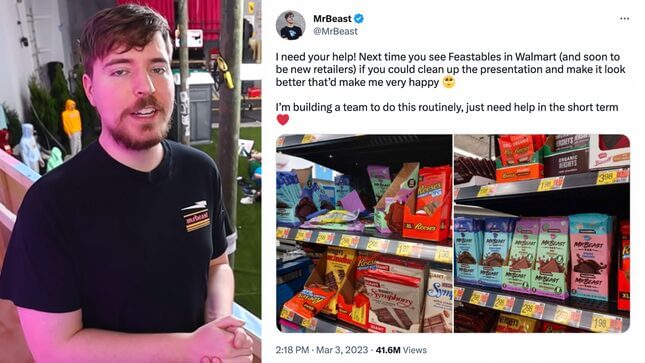I Can’t Stop Hate-Following MrBeast, the Stunt Philanthropist YouTuber
Between his white saviorism and doing anything to go viral, the 24-year-old embodies the worst and most obnoxious aspects of influencer capitalism.
Entertainment

Influencers are a lot like consultants in some regards: No one really knows exactly what they do, but there’s an undeniably sinister air to them. I first learned—quite against my will—about MrBeast (the world’s most popular YouTuber) in January, when he made headlines after paying for 1,000 blind people to have surgery to help them see again. And, of course, he filmed every minute of it, immediately validating a range of stereotypes about view-thirsty influencers. He also gifted one of them, who was unable to drive for years because of a vision problem, with a Tesla. This is the YouTuber’s schtick: shocking videos making a spectacle out of ostensible charity for his 131 million adoring subscribers.
By last week, MrBeast—a 24-year-old named Jimmy Donaldson—had wormed his way back to the top of my social media feeds for a second time since the eye surgery stunt, this time for imploring his vast army of internet “disciples” to clean up displays of his Feastables chocolate products in Walmart. The directive set off an online firestorm of equal-parts mockery and fierce defense. Here was a multi-millionaire, his critics said, gleefully and unabashedly calling on supporters—many of whom are children—for free labor to sell more products. Some called it a new low for late-stage capitalism.
And yet, I was captivated; his many detractors challenged the latest MrBeast stunt not by arguing with him, but rather by ruthlessly clowning him. My feed became overrun with tweets from users who claimed to have found and detained Walmart customers messing up his chocolate displays, asking MrBeast what to do with them. Others shared videos or photos of them messing up his chocolate displays.
Just as a means to get in on what had seemingly become Twitter’s inside joke du jour, I found myself falling down a rabbit hole into MrBeast’s background, trying to decipher what had made this particular influencer especially polarizing. His trolls had made a spectacle of the philanthropic shock jock, perhaps inadvertently advancing his ultimate goal of swallowing up as much of the attention economy as possible. Before long, I found myself converted into a hate follower, poring through the details of his career, determined to understand his meteoric rise.
According to Insider, MrBeast’s YouTube channel began in earnest with “early viral videos [that] included challenging feats like reading every word in the dictionary or counting from 0 to 100,000 for 40 straight hours.” Throughout the 2010s, he worked his way up to uploading gaming content and videos roasting other YouTubers. His breakthrough came with the aforementioned “counting to 100,000” gag—and he built upon that, err, success with a string of similar bits, including “Going Through the Same Drive Thru 1,000 Times.” All of this apparently proved lucrative for the North Carolina native, who started filming attention-grabbing giveaway videos and so-called “philanthropic stunts.” In addition to his January eye surgery video, in his latest video, posted this week, MrBeast claimed to have given 20,000 South African children their first pair of shoes.
This latest demonstration of supposed goodwill adequately sums up what makes him so controversial: Between white saviorism and doing anything to go viral, he embodies the worst and most obnoxious aspects of influencer capitalism. Other people’s lives, struggles, and poverty appear to be a playground for him, a means to a profitable end, all while raising his profile as a supposed societal benefactor. Yes, he’s “helping” people—but at the crux of it all, he’s profiting off of systemic inequities, making a viral show out of others’ suffering for his followers’ consumption, and doing so for his own enrichment.
I’m reminded of the above viral tweet from 2020, which some have likened to a summary of MrBeast’s business model: “Every heartwarming human interest story in america is like ‘he raised $20,000 to keep 200 orphans from being crushed in the orphan-crushing machine’ and then never asks why an orphan-crushing machine exists or why you’d need to pay to prevent it from being used.” MrBeast is a stunt philanthropist—a title that simply shouldn’t exist, and wouldn’t under a healthy, humane economic system.
The YouTuber’s whole Thing is engaging in seemingly benign acts, all under highly questionable circumstances, and all, ultimately, for his own advancement. The entire “philanthropic stunt” YouTube genre can only exist in the context of an American wasteland of economic suffering; there’s no incentive for MrBeast to meaningfully engage with or address inequality when his business relies on it to operate. And through it all, I can’t stop hate-following—I’ve never seen a more stark, cartoonish example of just how bleak our economic reality truly is.